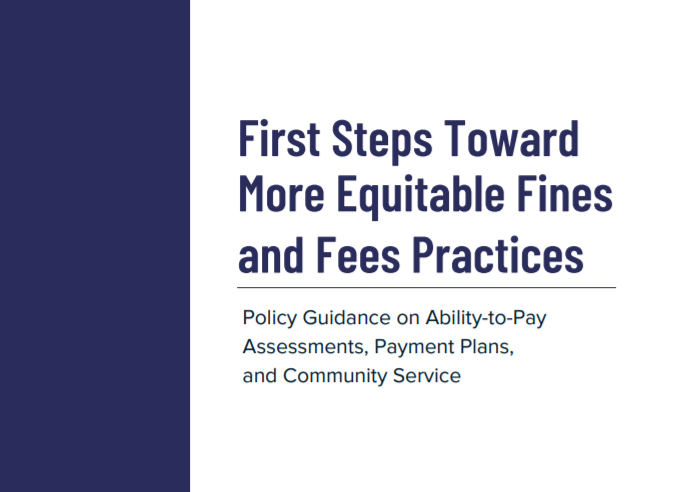FFJC Releases Policy Guidance on Ability-to-Pay Assessments, Payment Plans, and Community Service
Guidance Provides States & Localities With Roadmap to Meet Constitutional Requirements and Ensure Equity
Today, FFJC is launching a new, first-of-its-kind publication, First Steps Toward More Equitable Fines and Fees Practices: Policy Guidance on Ability to Pay Assessments, Payment Plans, and Community Service.
“Very few jurisdictions even meet the constitutional requirements for assessing defendants’ ability to pay fines and fees,” said Shanelle Johnson, Senior Policy Counsel at the Fines and Fees Justice Center. “These are first steps that jurisdictions can take to ensure fairness in the justice system, while improving efficiency. They may find it improves their bottom line in the process.”
An ability to pay assessment is the evaluation of an individual’s financial and personal circumstances, to ensure that fines, fees, or other monetary sanctions are proportionate to their ability to pay. After a court conducts an ability to pay assessment, and appropriately waives and/or reduces the amount owed, reasonable payment plans are necessary to ensure that people are able to meet their own and their families’ needs while also paying their court debt. Finally, community service offers individuals an alternative to monetary sanctions that better meets the community’s interest in public safety and accountability. This guidance is most effective when all three of these policies are adopted and implemented in unison.
Counterproductive fines and fees policies and practices have devastated the lives of millions of people in the U.S., trapping them in a cycle of poverty and punishment. In response, dozens of U.S. states and localities have enacted a wide range of fines and fees reforms in recent years. Many jurisdictions have also enacted emergency measures to alleviate the harms of fines and fees in light of Covid-19 and the ensuing economic downturn.
“Punishing people because they don’t have money to pay court fines and fees is bad economic policy and one of the least efficient ways to raise revenue,” said Priya Sarathy Jones, National Policy and Campaigns Director. “Instead of repeating the mistakes of the past, every state and local government should ensure that fines and fees are not a barrier to people caring for their own basic needs.”
FFJC views the three policies addressed in this publication as first steps — not comprehensive solutions — toward eliminating government reliance on fines and fees. The organization advocates for the elimination of all fees imposed in the criminal legal system and for the imposition of fines only in cases when the sentence does not include a term of incarceration or supervision. If imposed, however, fines should be both tailored to the offense and proportionate to an individual’s financial circumstances. No fines or fees should ever be assessed in juvenile cases.
“More and more jurisdictions are turning to ability to pay assessments as an answer to their fines and fees problems,” added Sarathy Jones. “But without addressing the misuse of fines and fees in the criminal justice system, this is only a short term solution. These policies are only effective when they’re enacted in a meaningful, consistent way and coupled with broader fines and fees reforms.”
###
